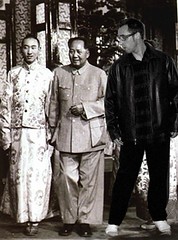(Best viewed in Internet Explorer)
Identity, Masks, and Mirrors
Who you are comes from many things. Sartre describes process of living "existence before essense" - that is, we exist before having any sort of identity.
Then we begin to learn what we like, and what we don't like. It is simple. But then socialization hits us hard.
For many, identity is a process of wearing masks. In certain social situations, one mask is appropriate, and in others another mask is needed. The adaptability of people is so strong that we change ourselves for others. This is necessary to survive socially.
However, beyond our masks, what is left? The most important and complex piece of our identity, is exceedingly simple in concept. We are, at our core, who we are when we just be. For some reason, just being is hard for many people. I think a lot of it is related to insecurity - when life is defined by situations, what is left when you're alone and without a situation?
Solitude and loneliness are important states of being for the development of identity. Without solitude, we are unable to contemplate our masks and determine what is left when there is no mask. Without loneliness, we are unable to feel the gravity of our existence and understand the fundamental truth of the grand responsibility we have for our lives and the relationship between self and others.
I am what I am.
I am not what I am not.
Mirrors. Mirrors are as important as masks for shaping identity. Humans constantly look for feedback. Without feedback we are unable to determine what is a misstep and what is acceptable. In fact, many people choose to do that which is unacceptable because it has predictable results.
Oddly enough, the power of mirrors in many is stronger than the self-presence that determines who the individual is. While I can say what I am for myself, what others say or reflect onto me has the potential of having more weight than my own opinion of myself. - How am I to judge?
The strangeness of this system is that people are so self-centered by and far, that they are unable to truly look at others and accurately describe them. In fact, people are so worried about how they appear in the mirrors they see around them, what they tend to reflect is what they think they should reflect. In many ways, this is a predictable and boring system.
Oh, what I would give to be rid of masks and mirrors and to just be with the rest of my people...
Then we begin to learn what we like, and what we don't like. It is simple. But then socialization hits us hard.
For many, identity is a process of wearing masks. In certain social situations, one mask is appropriate, and in others another mask is needed. The adaptability of people is so strong that we change ourselves for others. This is necessary to survive socially.
However, beyond our masks, what is left? The most important and complex piece of our identity, is exceedingly simple in concept. We are, at our core, who we are when we just be. For some reason, just being is hard for many people. I think a lot of it is related to insecurity - when life is defined by situations, what is left when you're alone and without a situation?
Solitude and loneliness are important states of being for the development of identity. Without solitude, we are unable to contemplate our masks and determine what is left when there is no mask. Without loneliness, we are unable to feel the gravity of our existence and understand the fundamental truth of the grand responsibility we have for our lives and the relationship between self and others.
I am what I am.
I am not what I am not.
Mirrors. Mirrors are as important as masks for shaping identity. Humans constantly look for feedback. Without feedback we are unable to determine what is a misstep and what is acceptable. In fact, many people choose to do that which is unacceptable because it has predictable results.
Oddly enough, the power of mirrors in many is stronger than the self-presence that determines who the individual is. While I can say what I am for myself, what others say or reflect onto me has the potential of having more weight than my own opinion of myself. - How am I to judge?
The strangeness of this system is that people are so self-centered by and far, that they are unable to truly look at others and accurately describe them. In fact, people are so worried about how they appear in the mirrors they see around them, what they tend to reflect is what they think they should reflect. In many ways, this is a predictable and boring system.
Oh, what I would give to be rid of masks and mirrors and to just be with the rest of my people...
























0 Comments:
Post a Comment
<< Home